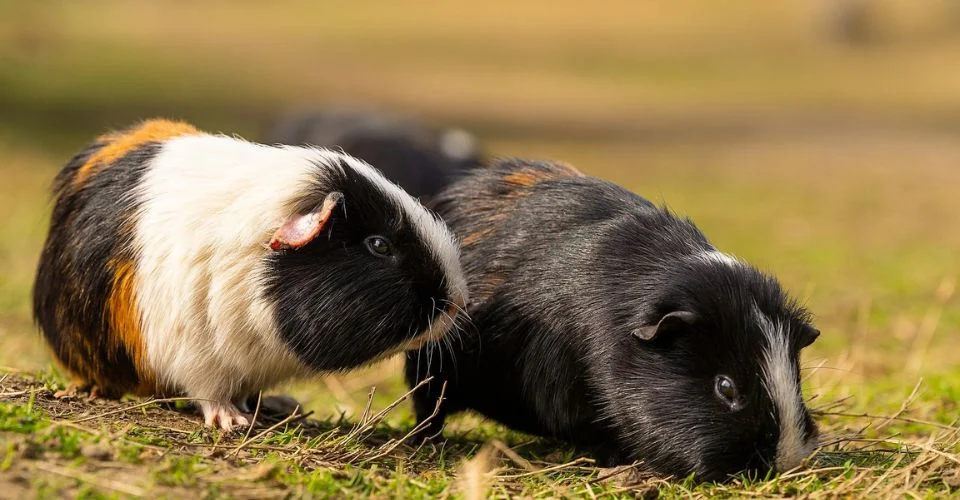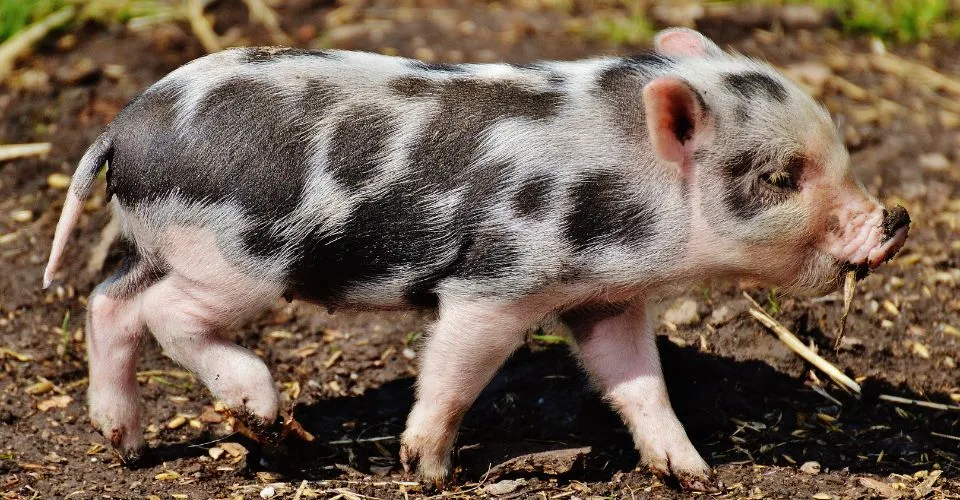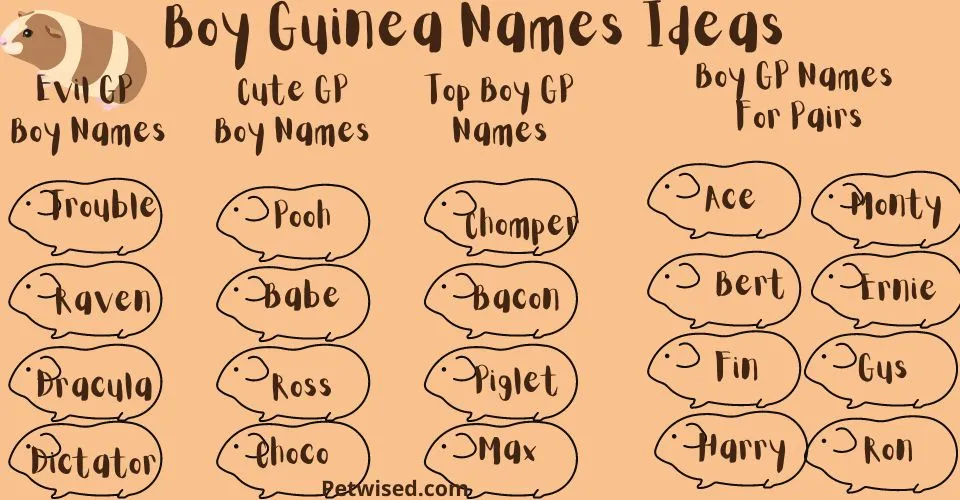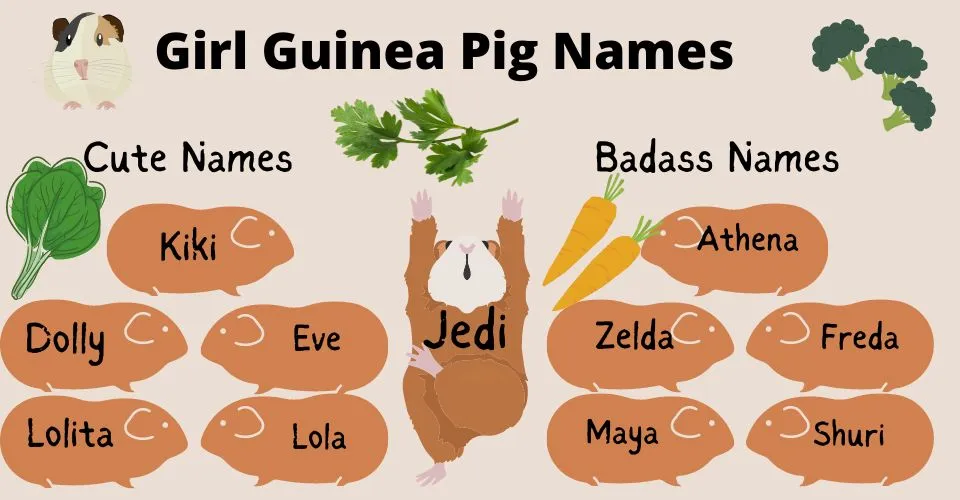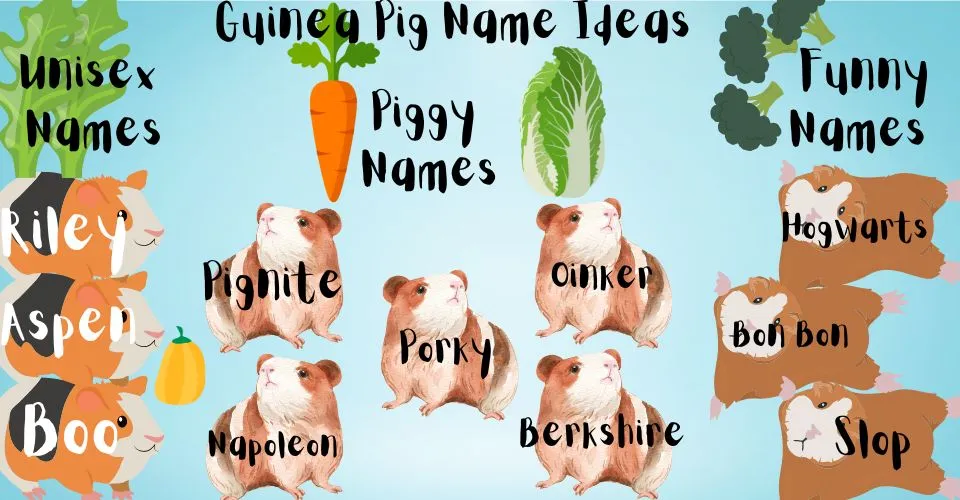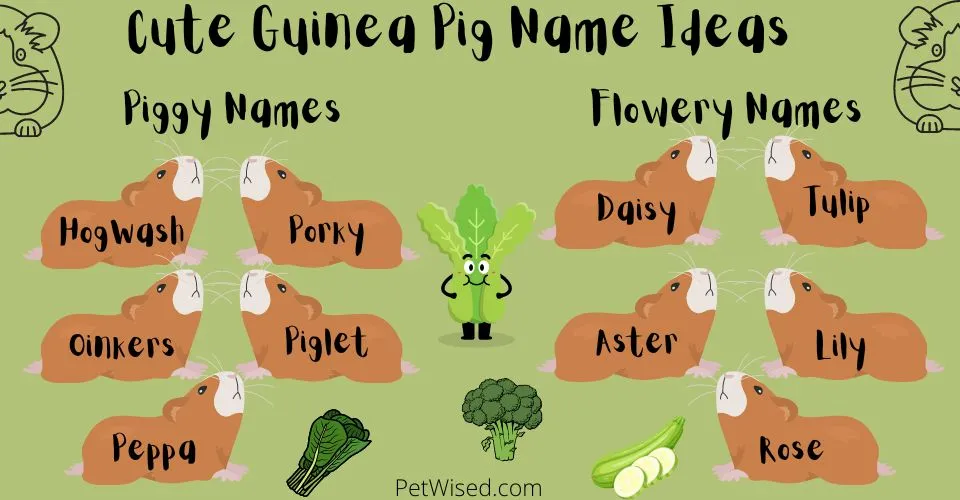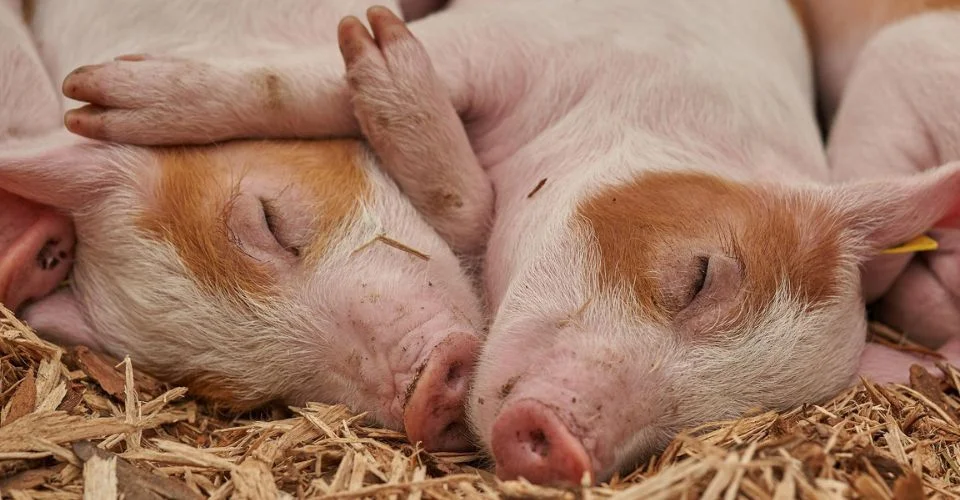With their shorthaired coats, American guinea pigs might not be the most exotic-looking guinea pig breeds like Silkie or Peruvian guinea pig, but they are one of the most popular. In fact, picturing guinea pigs in general, most people have American guinea pigs in their minds. Their popularity is attributed to their laid-back and friendly personality and low maintenance, making them a great pet choice for children and inexperienced pet owners.
American Guinea Pig
Hearing that American guinea pigs make a great choice for inexperienced owners and children, you might be thinking of getting your child an American guinea pig on his 5th birthday. Before you bid on an American guinea pig for sale, we advise you to familiarize yourself with the breed to know what you are buying yourself into.
Before diving into the details, take a quick look at the American guinea pig breed overview.
| American Guinea Pig Breed Overview | |
| Scientific Name | Cavia porcellus |
| Other Names | American cavy, English guinea pig, American shorthair guinea pig |
| Origin | South America |
| Length | 8 to 19 inches |
| Weight | 1.5 to 2.5 pounds |
| Lifespan | 4 to 8 years |
| Coat Color | White, red, cream, beige, black |
| Maintenance | Low-maintenance |
| Diet | Herbivores (timothy hay) |
| Cage | At least 30×60 inch enclosure |
| Ideal temperature range | 65° to 80° F |
| Temperament | Friendly, energetic, intelligent |
| Suitable for | Children, first-time pet owners |
| American Guinea Pig Scoreboard | |
| Friendly | 5/5 |
| Like to be held | 5/5 |
| Grooming Requirements | 2/5 |
| Energetic | 5/5 |
| Good with other Guinea Pigs | 5/5 |
| Good with Children | 5/5 |
American Guinea Pig History
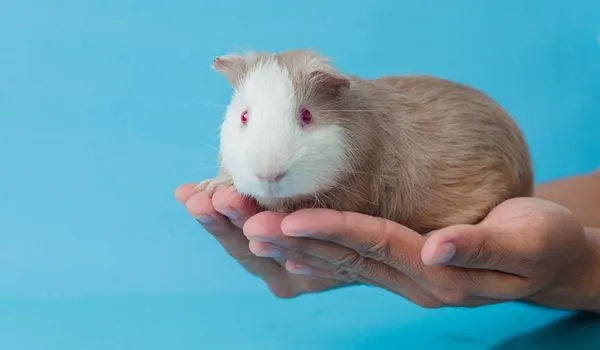
American guinea pigs are one of the oldest guinea pig breeds to be domesticated. Shortly after their domestication, they started appearing in folk art by 5000 BC. They originated in the Andes region of South America but today have become popular across Europe and the Americas. They are among the three most popular guinea pig breeds, the other two being Abyssinian and Peruvian.
While they are popularly known as American guinea pigs, they are called English guinea pigs in some areas. They are also known as American shorthair guinea pigs as they have shorthaired coats.
American Guinea Pig Personality and Temperament
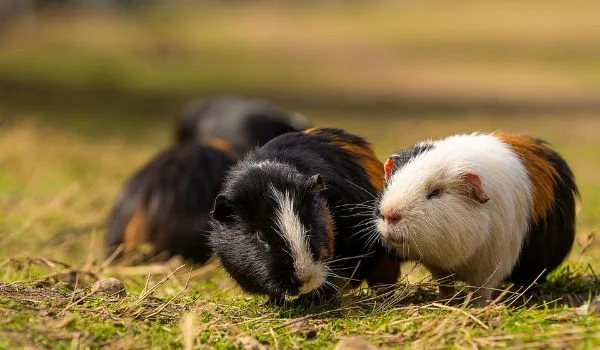
American guinea pigs are highly energetic, intelligent, and outgoing. They don’t like spending all day in their cage. They love to interact with their loving humans and enjoy being held and petted. Most American guinea pig owners say that their guinea pigs are the most affectionate and docile, have never displayed any type of aggression, and have never bitten any of their family members.
American guinea pigs make great family pets. They are extremely friendly and gentle and almost never bite their owners. They are highly energetic and don’t want to spend the whole day in their cage. For most of the day, they will like to be out, play, and cuddle with their owners or spend time exercising, training, and running around. Just learn how to properly hold a guinea pig, and your American guinea pig would become your best friend.
Like other guinea pig breeds, American guinea pigs are also social creatures and really appreciate if they are kept in pairs. If you put another guinea pig in your American cavy’s cage, you will find them snuggling into each other in a matter of days. That said, in rare cases, where an older guinea pig has spent his whole life in solitary, without the company of a furry friend, a cage companion might not be desired.
American Guinea Pig Appearance
American guinea pigs have a soft short-haired coat, a round snout, round eyes, and petal-like ears.
They are a bit stubby in appearance and look just like a furry potato, with a cylindrical body shape.
American Guinea Pig Size
Like other guinea pig breeds, American guinea pigs are petite creatures. A full-grown American guinea pig is about 8 to 9 inches long and usually weighs around 1.5 to 2.5 pounds. Sometimes, American guinea pigs may grow up to 3 pounds in weight. That said, American girl guinea pigs are a bit smaller in size than American boy guinea pigs.
American Guinea Pig Colors
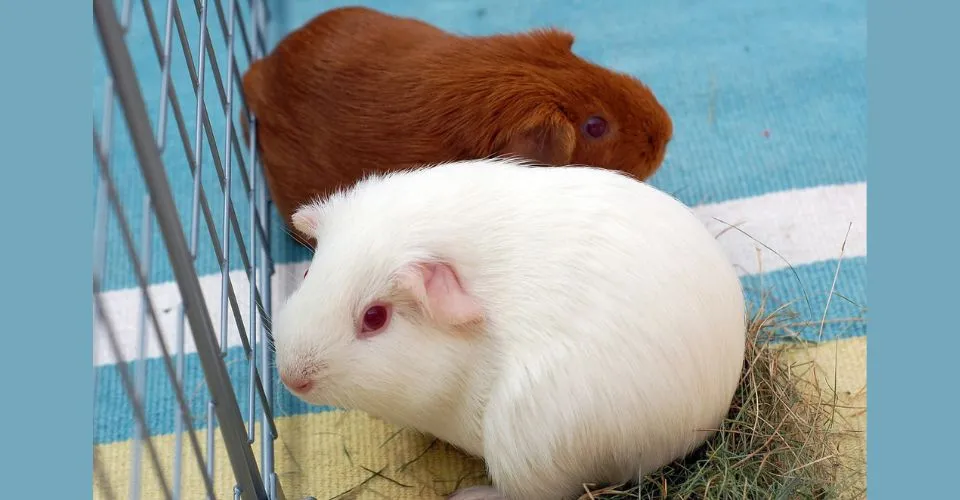
The soft, shorthair coats of American guinea pigs come in a wide range of colors and combinations. The most common American guinea pig colors include white, red, cream, beige, black, lilac, and black. American guinea pigs can be solid in color and may feature other color patterns, including bicolor, tricolor, brindle, calico, roan, and tortoiseshell.
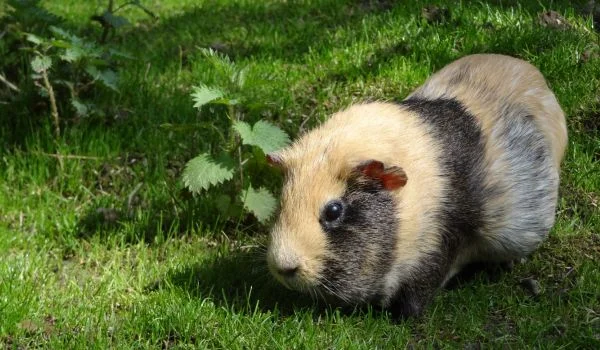
What is American Stain Guinea Pig?
American Satin guinea pigs are just like American guinea pigs and have a short coat that is soft to touch. The only difference is that the American stain guinea pigs have a bit of extra shine and glossiness in their coats.
American Stain guinea pigs inherit the docile and friendly personality of American guinea pigs. But where American guinea pigs make a great choice for children and inexperienced pet owners, American stain guinea pigs best suit adults or mature teens who can provide for the special needs of American Stain guinea pigs.
Like other stain guinea pig breeds, American Stain guinea pigs are prone to a plethora of health issues, including physical deformities.
How to Care for an American Guinea Pig?
American guinea pigs are low-maintenance, but there are certain things that you should know to make sure that your American guinea pig stays happy and healthy and keeps popcorning and wheeling with joy and happiness.
Feeding
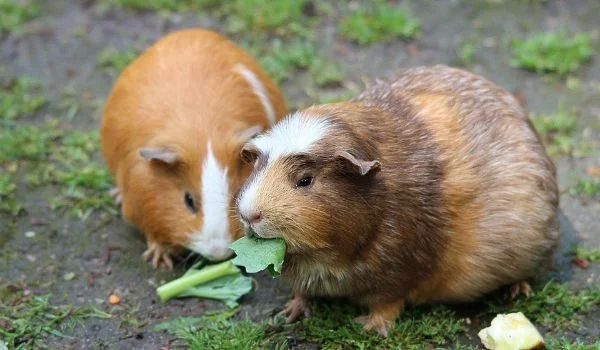
American guinea pigs don’t have any special nutritional requirements; they just need the basic guinea pig diet. You should make sure that your American guinea pig has a constant supply of fresh and high-quality timothy hay. Munching on timothy hay would provide dietary fibers to your English cavy and keep the teeth growth in check.
You should also keep in mind that, like other guinea pigs, American cavies are also unable to make their own vitamin C. Thus, they need it from external sources. You can meet your guinea’s vitamin C requirements by feeding him fresh veggies like basil, arugula, collard greens, squash, etc. You should make sure that the veggies are fresh as the vitamin C diminishes quickly. You can also feed some fresh fruits like strawberries and apples to your piggy friends but only in moderate amounts.
Besides, you should also provide around a quarter cup of guinea pig food pellets fortified with vitamin C. You should make sure that these food pellets are fresh, as the value of vitamin C in them diminishes with time.
You may also have to provide vitamin C supplements to your American cavy if the fresh veggies and pellets seem not to fulfill his needs for vitamin C. In case of vitamin C deficiency, your piglet may develop scurvy and exhibit bad coat health.
Grooming
American guinea pigs do not have many grooming requirements due to their short hair coat. They don’t need daily brushing like Silkie guinea pigs. A quick brushing once a week would be more than enough for American guinea pigs to maintain a healthy coat. It would be best to brush their fur in the direction it lays.
You don’t have to worry about shampooing your American guinea pigs as they are not prone to knotting and matting. You can also forget about trimming their hair. That said, you will have to trim their nails every other week.
Like brushing, you don’t have to bathe your American guinea pig often—bathing a few times a year would be more than enough. You should only bathe your American cavy when he gets dirty or smells. Bathing your English cavy more often would not only be irritating to their skin but would also rob them of natural skin oils. Excessive oil buildup may also be undesired, requiring you to give your cavy a quick bath.
Enclosure Set-up
American guinea pigs are small, so you may think a small enclosure would be appropriate. You are mistaken. American guinea pigs are smart, highly active, and energetic. They love to explore, exercise, and roam around. So you will have to provide them with a large guinea pig cage, which has plenty of room for them to move around and play with their cage mate. Guinea pigs are no climbers, so there is no need to put up perches in their cages. However, you can put guinea pig hides in the cage for each pig. As guinea pigs are clean and fastidious creatures and don’t smell, you should keep their cage clean and tidy all the time.
Exercise
Guinea pigs don’t sleep much; they are active for most of the day. According to RSPCA, guinea pigs sleep only for about 4 hours and are active up to 20 hours a day. While they won’t complain, they don’t like to spend all day long in their cage. They want to get out, interact with their loving owners, and explore the space. So if you have time, you should try to get your American cavies out of their cage and play around. If you have a cat or dog living under your roof, you should be very careful about getting your piglets out of their cage.
Training
American guinea pigs are extremely intelligent and energetic. So they are always up for adventure and to learn new tricks. If you have a handful of tasty treats and can be patient, your guinea pig can learn many tricks. You should start training your American caves as they get a few weeks old.
You can begin the training by teaching your guinea pig its name. Pick a cute guinea pig name that suits your cavy’s personality, have some treats in hand, and get your guinea’s attention. Once you are all set, you should call your guinea’s name and when he responds—looks at you or whereabouts—you give him a treat. Just keep repeating it with patience, and before you know it, your guinea will start coming to you as you call his name.
Once your American cavy has learned his name, you can begin litter training him—teach him how to use the litter box. Getting your cavy to relieve him in one spot—litter box—would mean less cleaning work for you.
Housebreaking American Guinea Pigs
To housebreak your guinea pig, you should first spot the point where your piglet is relieving himself. You can place the litter box with some fecal pellets inside it and some timothy hay. We advise you not to push your guinea pig into the litter box; it could be counterproductive. You should wait for your American shorthair guinea pig to choose to visit the litter box region and then relieve himself in it. When your guinea pig does that, you should be there with a handful of treats. You should make a little noise to appreciate your piglets’ good work and offer them a treat.
Teaching American Guinea Pigs to Stand
This is very easy—you just need to hold a treat above your cavy’s head and repeat the word stand. When they stand to get their treat, you will offer a treat. Do this twice a day regularly, and within a few days, he will start standing up on your command. You can remove the treat factor and reward your buddy with some noisy appreciation or pets.
American Guinea Pig Health
American guinea pigs are hardy and hearty creatures and are one of the longest-living guinea pig breeds. But they are prone to various health issues. Below we have briefly discussed the most common American guinea pig health issue.
Diarrhea
Like other guinea pigs, American guinea pigs have a sensitive stomach, so whenever they eat something they were not supposed to eat, they get a stomach ache, which often leads to diarrhea. Guinea pig diarrhea requires immediate attention because if left untreated, your guinea pig might suffer from dehydration, weight loss, etc. According to Guinea Pig Poop Chart, a guinea pig suffering from diarrhea would have soft, smelly, and mushy poop.
Scurvy
American guinea pigs cannot make their own vitamin C like other guinea pigs and thus need it in their routine diet. If guinea pigs don’t get enough vitamin C supplements in their diet, their coat and skin health deteriorate, and they develop scurvy. Therefore, you should try to provide additional vitamin C supplements in addition to the vitamin C in their diet.
Urinary tract Problems
Urinary tract problems are pervasive among all guinea pig breeds. American guinea pigs may experience bladder stones, which cause tremendous discomfort and may also result in blood in guinea pigs’ urine. Check out our Guinea Pig Urine Color Chart to know what else your guinea pig pee has to tell you about your piggy’s health.
| American Guinea Pig Health Issues | |
| Health Issues | How To Avoid |
| Diarrhea | Careful with what you feed your guinea pigIntroduce new food in small amounts |
| Scurvy | Vitamin C supplements |
| Urinary tract problems | Low calcium foods and treats |
How Much Does an American Guinea Pig Cost?
American guinea pigs are not much expensive, especially when compared to longhaired show guinea pig breeds. You can easily get them anywhere around 10 to 40 or 50 bucks. Depending on the color pattern and reputation of the breeder, you might have to pay sometimes more than that.
Where can I buy an American Guinea Pig?
We advise you to visit your local animal rescue center. We are sure that you will find some cute little fella desperately waiting for you to take them along to your sweet and loving home packed with children and devoted pet parents. BY finding an American Guinea pig in a local shelter, you can bring home a beautiful cavy by just paying the adoption paper fee.
| Should You Get an American Guinea Pig? | |
| Pros | Cons |
| They are docile and friendliest of the guinea pigs | They are highly energetic requiring more exercise |
| They don’t bite—not even when they are anxious | They don’t like to be kept in isolation—they should be kept in pairs |
| They are very low maintenance | They require a spacious cage and need some time out of the cage as well |
American Guinea Pig Names
Naming your new guinea pigs is fun but it could be challenging sometimes. If are having a hard time finding a good name for your American guinea pig, take a look at the brief list of names, given below. If you fail to find a good name from the below list, you can check out our posts: Guinea Pig Names, Boy Guinea Pig Names, Girl Guinea Pig Names, and Cute Guinea Pig Names.
| Babe | Daisy | Slop | Jedi |
| Max | Tulip | Bon Bon | Maya |
| Piglet | Rose | Hogwarts | Laila |
| Pooh | Aster | Ham | Freda |
| Bart | Lily | Chug | Lola |
